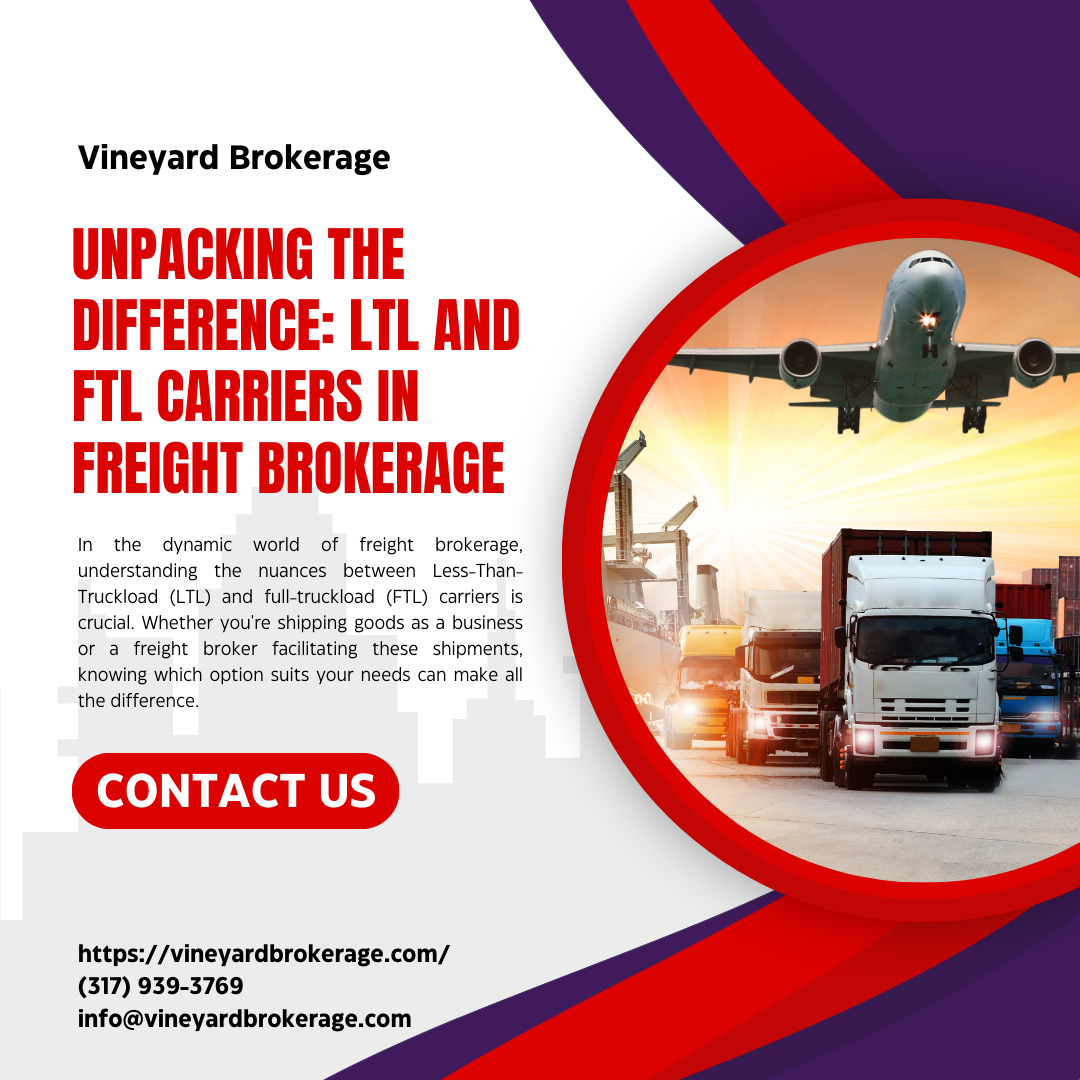Unpacking the Difference: LTL and FTL Carriers in Freight Brokerage

In the dynamic world of freight brokerage, understanding the nuances between Less-Than-Truckload (LTL) and full-truckload (FTL) carriers is crucial. Whether you’re shipping goods as a business or a freight broker facilitating these shipments, knowing which option suits your needs can make all the difference. In this blog, we’ll dive into the world of LTL and FTL carriers to help you make informed decisions when shipping your cargo with VineyardBrokerage.
LTL Carriers: When Less Is More
LTL carriers are the go-to option when your freight only fills part of the truck. Here are some critical characteristics of LTL shipping:
- Cost-Efficiency: LTL carriers are cost-effective for shipping smaller loads because you only pay for the space your cargo occupies. This can significantly benefit companies wanting to reduce their transportation costs.
- Shared Space: With LTL carriers, your cargo shares space with other shipments. This collaborative approach allows multiple shippers to pool their freight, making it an environmentally friendly and budget-conscious choice.
- Ideal for Smaller Loads: LTL is the way to go if you have a shipment that doesn’t require an entire truck. It’s perfect for smaller businesses or those with varying shipping needs.
- Frequent Stops: LTL carriers make multiple stops to pick up and deliver various shipments along their route. While this may extend transit times slightly, it allows for efficient resource utilization.
FTL Carriers: When Space Matters
FTL carriers are preferred when you have enough cargo to fill an entire truck. Here’s an explanation of FTL shipping:
- Exclusive Use: You exclusively use the entire truck with FTL shipping. This means your cargo needs to share space with other shipments, which can be crucial for particular industries or sensitive goods.
- Faster Transit Times: Your cargo reaches its destination faster since FTL carriers don’t make multiple stops. This speed is essential for time-sensitive shipments.
- Consistency: FTL shipments offer consistency that’s only sometimes achievable with LTL. You have greater control over your cargo’s timing, route, and handling.
- Ideal for Large Shipments: When you have a substantial volume of goods, FTL carriers provide the space and capacity needed to do the job efficiently.
Vineyard Brokerage: Your Freight Solutions Partner
At Vineyard Brokerage, we understand that every shipment is unique, and choosing between LTL and FTL carriers requires careful consideration. Since your demands are unique, we provide professional advice as well as a variety of services:
- Customized Solutions: We work closely with you to determine whether LTL or FTL best fits your shipment. We aim to provide cost-effective, efficient, and reliable solutions tailored to your cargo.
- Extensive Network: Our extensive carrier network gives us access to many choices for LTL and FTL shipments. This ensures your cargo gets where it needs to go on time and within budget.
- Safety and Reliability: Safety is our top priority. We partner with carriers known for their commitment to secure and reliable transportation, giving you peace of mind throughout shipping.
- Advanced Technology: We leverage cutting-edge technology to track and manage your shipments in real-time, providing transparency and visibility at every journey stage.
Conclusion
Choosing between LTL and FTL carriers can significantly impact your shipping costs, transit times, and overall logistics strategy. At Vineyard Brokerage, we’re here to simplify that decision-making process. Whether you opt for LTL’s cost-efficiency and shared space or FTL’s exclusivity and speed, our expert team is ready to help you find the perfect solution for your cargo needs. Trust us to be your partner in navigating the complexities of freight brokerage and ensuring your shipments reach their destination smoothly and efficiently.

